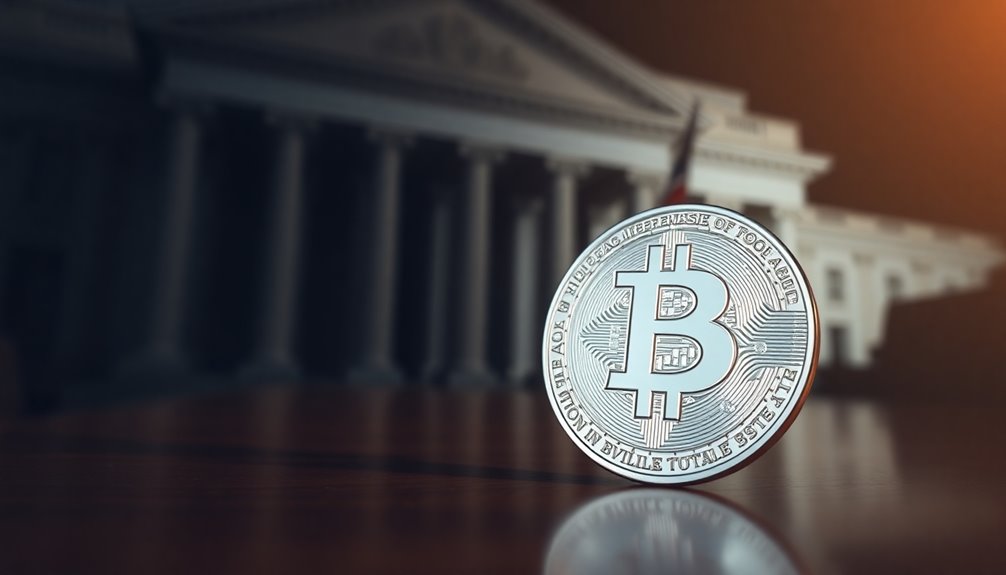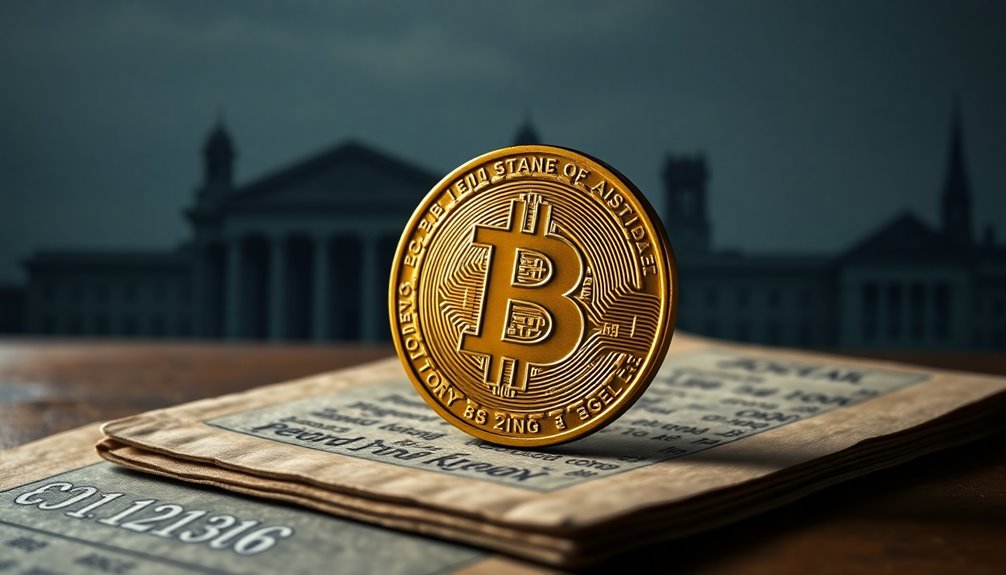You'd think the Federal Reserve just declared a war on Bitcoin with its latest move to keep these reserves off-limits for central banks. This decision raises questions about the balance between innovation and stability in an increasingly volatile financial landscape. What does this mean for the future of cryptocurrencies and the role of central banks in a digital economy? As you explore the implications of this ruling, you'll find that the stakes are higher than ever for both traditional finance and the burgeoning world of digital assets.
Key Takeaways
- The Federal Reserve prohibits member banks from holding most cryptocurrencies, including Bitcoin, due to associated risks.
- Legal restrictions prevent the Federal Reserve from owning Bitcoin without Congressional approval.
- The focus of the Fed's policy is on preserving the stability of the banking system, not regulating cryptocurrencies directly.
- Bitcoin's market volatility and risks like fraud contribute to skepticism about its viability as a reserve asset for central banks.
- Over 212,000 BTC is held by the U.S. government from law enforcement seizures, but this does not equate to central bank reserves.
Central Banks' Bitcoin Restrictions

As central banks grapple with the rise of cryptocurrencies, they've increasingly imposed restrictions on Bitcoin and other digital assets.
The Federal Reserve now interprets existing laws to regulate digital assets within the banking system. They're prohibiting member banks from holding most crypto assets, citing major risks like fraud, legal ambiguity, and volatility. Bitcoin's supply is capped at 21 million coins, which is a factor that adds to its perceived value and also contributes to market speculation.
Security concerns are also paramount, especially due to the anonymity inherent in cryptocurrency transactions. If member banks want to use stablecoins, they must meet specific security requirements and obtain formal approval.
This regulatory shift marks a significant chapter in the ongoing battle over the digital asset landscape, aligning closely with recent Federal Reserve actions that aim to protect the financial ecosystem from crypto's unpredictable nature.
Regulatory Bitcoin Reserve Restrictions

While the U.S. Federal Reserve can't own Bitcoin due to legal prohibitions, it's essential to understand the implications of this restriction. Any change in this policy would need Congressional action, and the Fed isn't pursuing legislative amendments to allow crypto ownership. Furthermore, the Fed has explicitly dismissed rumors of creating a Bitcoin reserve, emphasizing its focus on traditional monetary policy.
Currently, the U.S. government holds over 212,000 BTC from law enforcement seizures, but the Fed's primary focus remains on protecting the banking system, not directly regulating cryptocurrencies.
Federal agencies are adopting a cautious approach, monitoring crypto-asset-related activities among banks. They aim to ensure these activities comply with laws while managing associated risks.
Skepticism about Bitcoin's utility as a reserve currency further complicates the landscape, making regulatory restrictions even more pronounced.
Cryptocurrency Market Volatility

Cryptocurrency market volatility can catch even seasoned investors off guard, driven by a mix of market sentiment, supply and demand dynamics, and external factors.
Positive news can send prices skyrocketing, while negative news often triggers rapid declines. Emotional trading amplifies these swings, fueled by fear and greed, leading to herd behavior. Moreover, the limited supply of certain assets can exacerbate price increases when demand surges. Large investors, or "whales," can also manipulate trends through substantial trades. Additionally, investor sentiment plays a crucial role in shaping price movements, as shifts in public perception can lead to rapid market reactions. The unpredictability of the market is further complicated by the role of mining difficulty, which can influence the availability of Bitcoin and other cryptocurrencies.
Security breaches and regulatory changes further add to the uncertainty, causing panic and mass sell-offs. As a result, you must stay informed and prepared for the unpredictable nature of this market to navigate its challenges effectively.
Corporate Blockchain Integration

Integrating blockchain technology into corporate operations offers significant advantages that can transform how businesses function.
You'll benefit from higher data security through digital signatures and immutable records, ensuring your data remains safe and accessible only to authorized users. Additionally, natural language processing can be utilized to enhance customer interactions and overall service efficiency.
Transparency and clear reporting come into play, reducing disputes and enhancing supply chain visibility, which fosters regulatory compliance. Additionally, blockchain's transparency provides immutable records accessible to all parties, which reduces disputes and accelerates reconciliation.
Moreover, blockchain helps you lower operating costs by automating manual tasks and eliminating intermediaries, resulting in efficient operations. This automation can lead to increased data analysis speed and accuracy, further optimizing business processes.
You'll also experience improved speed of operations, with instantaneous processes facilitated by smart contracts that enhance agility and accelerate product delivery.
Embracing blockchain can boost customer loyalty and drive revenue, making it a game-changer for your business.
Government Actions and Market Reactions

As the U.S. government explores innovative strategies to support the economy, recent proposals surrounding a Strategic Bitcoin Reserve (SBR) have sparked significant debate.
Senator Cynthia Lummis's plan to purchase 1 million Bitcoins over four years has drawn mixed reactions. Critics argue the SBR lacks purpose, given the dollar's strong reserve status, while supporters see it as a potential financial hedge. The proposed funding sources, including seized Bitcoin and revalued gold certificates, add complexity to the initiative. Regulatory challenges also loom, with the volatile crypto market needing clearer oversight.
Moreover, global adoption of Bitcoin could shift reliance away from the dollar, raising concerns about U.S. sanctions capabilities and the overall impact on international finance. The initiative's funding strategy aims to leverage gold certificates to support the Bitcoin acquisition, highlighting its financial complexities.
Central Bank Digital Currency Trends

While many countries are exploring Central Bank Digital Currencies (CBDCs) to enhance their financial systems, challenges remain that hinder widespread adoption.
You might notice a lack of public awareness and trust, which slows down acceptance. Many users still prefer traditional payment methods, making it tough for CBDCs to gain traction.
Additionally, financial institutions often lack incentives to promote these new currencies. Security risks and potential system failures can create further hesitation.
There's also uncertainty surrounding CBDC design and the integration into existing systems, raising concerns about privacy. Moreover, the need for incentive mechanisms to motivate intermediaries and users remains a significant barrier to effective implementation.
Despite these hurdles, 134 jurisdictions are actively researching or developing CBDCs, showcasing a global interest that's hard to ignore, especially with live examples like China's digital yuan leading the way.
Frequently Asked Questions
Why Are Central Banks Interested in Bitcoin Reserves?
Central banks are interested in Bitcoin reserves for several reasons.
You'll find that its fixed supply makes it a unique store of value, much like gold. Bitcoin's low correlation with traditional assets helps diversify portfolios, enhancing resilience against economic fluctuations.
Plus, it carries no default risk, as it isn't dependent on cash flows.
Finally, its deflationary nature positions it as a hedge against inflation, making it an attractive option for modern reserve strategies.
How Does Bitcoin Impact Traditional Banking Systems?
Bitcoin impacts traditional banking systems by challenging their roles in transactions and payments.
You'll notice that cryptocurrencies enable peer-to-peer transactions, reducing reliance on banks. This disintermediation lowers transaction fees and speeds up cross-border payments.
Additionally, banks must adapt by incorporating blockchain technology to stay competitive and relevant. The rise of Bitcoin pushes banks to rethink their strategies, leading to innovation and new services tailored for a more decentralized financial landscape.
What Are the Risks of Bitcoin for Central Banks?
Did you know that Bitcoin's price can swing by over 10% in just a single day?
For central banks, this volatility poses significant risks. If you hold Bitcoin as a reserve, the rapid price fluctuations could lead to substantial losses during downturns.
Additionally, the lack of regulation raises compliance issues and the potential for illicit activities.
Cybersecurity threats also loom large, demanding advanced technology to safeguard your assets against attacks and breaches.
Can Central Banks Ever Hold Cryptocurrencies Legally?
You might wonder if central banks can ever hold cryptocurrencies legally. Currently, regulations in various countries create a complex landscape.
In the U.S., for instance, existing policies largely prevent member banks from holding crypto assets. Additionally, the SEC oversees many cryptocurrencies, complicating matters further.
While central banks are exploring Central Bank Digital Currencies (CBDCs), which mimic some crypto benefits, the legal landscape for direct cryptocurrency holdings remains uncertain and cautious.
How Do Citizens Feel About Central Bank Bitcoin Restrictions?
You might find that citizens have mixed feelings about central bank Bitcoin restrictions.
While some welcome the security of regulation, many express concerns over potential control and privacy loss. They worry about job impacts in traditional banking and the risk of increased economic inequality.
Trust issues also arise, as citizens seek clarity and transparency in how these regulations will affect their financial futures.
Ultimately, uncertainty fuels a diverse range of opinions on the matter.
Conclusion
In conclusion, the Fed's firm stance on Bitcoin reserves reflects a prudent approach to financial stability amidst a turbulent crypto sea. By steering clear of such volatile assets, central banks can focus on fostering a secure economic environment. As the regulatory landscape evolves, you'll likely see a greater emphasis on digital currencies that align with traditional banking principles. The future may bring innovative solutions, but for now, caution remains the name of the game in the world of finance.









